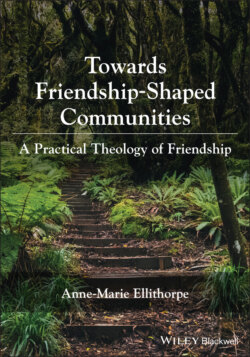Читать книгу Towards Friendship-Shaped Communities: A Practical Theology of Friendship - Anne-Marie Ellithorpe - Страница 27
How Does Technology Shape Contemporary Friendships and Communities?
ОглавлениеDigital technologies are altering the ways in which friendships are maintained and perhaps even the way some conceptualize friendship. Various forms of technology allow opportunities for fostering preexisting relationships and developing new ones. Mobile phones, social networking sites, and video-chat software and devices make it possible to stay connected in new ways. While patterns of friendship and opportunities for friendship are being shaped by new technologies, the long-term impact of these technologies on friendship patterns and opportunities remains to be seen. Currently, both benefits and challenges are evident.
New technology, for those who can afford it, has the potential to sustain and deepen friendships and has certainly been invaluable in allowing for social connections to take place remotely during the Covid-19 pandemic. Yet contemporary addictions to digital technology inhibit human capacities such as empathy and self-reflection; various technological innovations enhance the pressure to conform, providing “new tools for ancient impulses.”37
Mobile phones play a role in organizing, planning, and celebrating friendship activities, yet prove to be a distraction during face-to-face time. “Fear of missing out” (FOMO) contributes towards attentiveness to digital communication at the expense of in-person communication. Paradoxically, friends can be hyper-vigilant in their attention to texts from one another when apart yet lack attentiveness to one another when they are together.
Online social networking sites allow old friends to rediscover one another and geographically dispersed friends to maintain some degree of connection. Yet time spent online can detract from time given to the maintenance of local friendships. Social networking can be addictive, providing cold comfort in the search for intimacy. As philosopher Diane Jeske notes, “social media threatens to reduce friendship’s contribution to the good life.”38 While social media makes it easy to connect to those with common interests, ideals, and ideas, it also makes it easy to avoid interaction (face-to-face or otherwise) with those with differing perspectives.39 Social media fosters a comparison-based culture, and has been used to spread disinformation, thus exacerbating political polarization.
Facebook has co-opted and devalued the word friend, using it as an active verb for an activity more appropriately described as networking. This may contribute to friend now being used to include those who are simply acquaintances. Further, Facebook is guilty of dishonoring its stated intent to not only connect people but build community. Facebook first described itself as an online directory, connecting people at colleges through social networks. In 2006, it broadened to “a social utility that connects you with the people around you.” In 2013, founder Mark Zuckerberg wrote a Facebook post called “Is Connectivity a Human Right?” describing the mission of his company to make the world more open and connected.40 By mid 2017, the stated mission of Facebook was “to give people the power to build community and bring the world closer together.”41 Yet Facebook has become an advertising agency (both collecting data and selling ads) and a media company.
In the pursuit of profit, Facebook appears to have broken the vows implicit in its mission statement by detaching wealth-creation from social responsibility. As Harvard historian Jill Lepore notes: “During the years of the company’s ascent, the world has witnessed a loneliness epidemic, the growth of political extremism and political violence, widening political polarization, the rise of authoritarianism, the decline of democracy, a catastrophic crisis in journalism, and an unprecedented rise in propaganda, fake news, and misinformation.”42 While Facebook may not be directly responsible for any one of these concerns, “evidence implicates the company as a contributor to each of them.”43 During the course of the Covid-19 pandemic, Facebook has both provided tools for staying connected with friends and allowed for the nurturing of division.
Social media and other technologies do provide useful strategies for the maintenance of friendships. However, the most commonly used aspects of social media are not well-suited to building, reinforcing, or maintaining trust, openness, and authenticity. It is tempting to turn to technology when we are busy, rushed, and spread thin; it is easier to engage via social media than to find ways to meet in person. In times of crisis, or when it comes to maintaining long-distance relationships, the connectivity that technology allows can be a gift. Clearly, however, we need to be discerning in the use of technology, in order that inherent dangers and disadvantages do not outweigh the benefits.44
